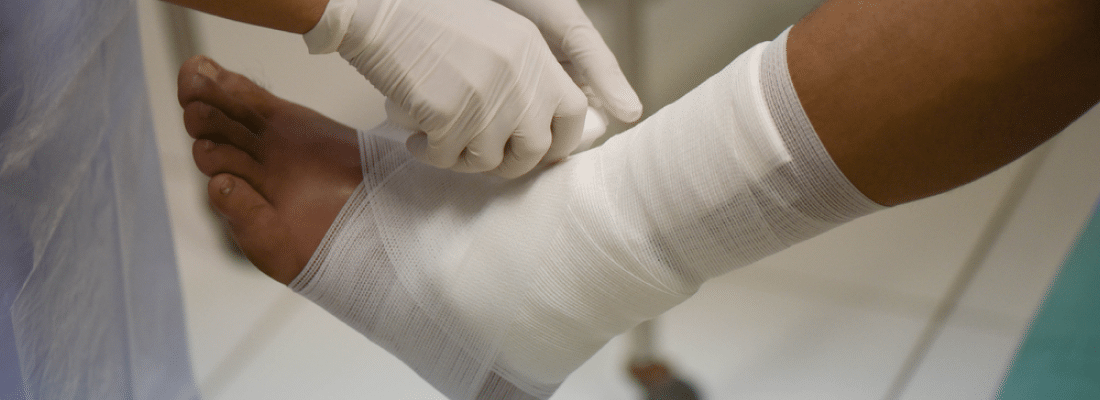Foot Wound Care & Treatment

At University Foot Associates, we provide foot wound care to treat all foot and ankle-related wounds. Injuries that do not heal or foot pain associated with movement can highly affect a patient’s quality of life. Successful treatment requires a podiatrist’s assessment of both the injury and the patient’s overall condition. By listening to the patient, carefully addressing all concerns, and reviewing medical history, our podiatry team can provide appropriate and complete wound care.
Basic foot injuries that are left untreated can later cause more painful disorders and infections. Symptoms of foot infections include- swelling, redness, or a puncture. A more serious bone infection is possible as well. If you display these signs or symptoms, schedule a podiatrist appointment as soon as possible to receive proper wound care.
Types of Foot & Ankle Wounds We Treat
- Cuts
- Scrapes
- Bruises
- Ulcers
- Diabetic Foot Care
- Skin Conditions
- Puncture Wounds
- Broken Toes

Start living pain-free again
Diabetic Wound Care For Ulcers
- Patients with diabetes are more prone to foot sores or ulcers. These happen due to poor circulation, bad lifting shoes, trauma, and other factors. Diabetic patients must visit the podiatrist regularly to identify any risk factor that can lead to infection of the feet. At University Foot Associates Dr. Nasser and Team diagnose and treat all the medical conditions of the foot, including diabetic wound care.
- Even if you feel perfectly healthy, it is a good idea to go to a podiatrist for a regular check-up.
- In addition to diagnosing and treating diabetic foot conditions, Dr. Nasser and his team focus on patient education. They work closely with patients to develop personalized foot care routines, including guidance on proper footwear, daily foot inspections, and lifestyle modifications to improve circulation and overall foot health. With proactive care and regular check-ups, many serious complications can be prevented, helping diabetic patients maintain mobility and quality of life.
- Regular visits to a podiatrist can help catch potential issues early before they develop into more serious problems. For diabetic patients, even small foot wounds or blisters can become major concerns if left untreated, potentially leading to infections, ulcers, or even amputations in severe cases. The team at University Foot Associates provides comprehensive foot care tailored to diabetic patients, ensuring that any signs of damage, pressure points, or circulation issues are addressed quickly and effectively.
Foot Wound FAQs
Q: What is the proper way to heal a foot wound?
A: For open wounds on the feet, follow normal First-Aid standards. Clean the wound and remove any debris, apply antibiotic healing ointment, and cover the wound with the appropriate size bandage. Seek medical care with a podiatrist or wound care specialist.
Q: Why is it important to see a podiatrist for foot wound care?
A: Foot wounds can be difficult to heal due to reduced circulation in the feet, especially for individuals with diabetes or other vascular issues. A podiatrist is specially trained to assess, treat, and monitor foot wounds, ensuring they heal properly and preventing infections or further complications.
Q:What types of foot wounds should I seek treatment for?
A: Foot wounds can range from minor cuts and scrapes to more serious issues like ulcers or deep puncture wounds. If a wound is not healing properly, appears infected (redness, swelling, warmth, or pus), or you have a medical condition like diabetes, it’s important to seek prompt podiatric care to prevent complications.
How to Reduce the Risk of Foot Wounds
Making preventative foot care part of your daily routine can significantly lower your risk of developing foot wounds—especially if you have diabetes or other underlying health conditions. Here are essential strategies to help keep your feet healthy and wound-free.
Inspect Your Feet Daily
Examine your feet every day for cuts, blisters, redness, swelling, or any changes in the skin. Use a mirror to check the bottoms of your feet or ask for help if needed. Early detection of minor issues can prevent them from becoming serious wounds.Keep Your Feet Clean and Moisturized
Wash your feet daily with mild soap and lukewarm water. Dry them thoroughly, especially between the toes, to prevent fungal infections. Apply a moisturizing cream to prevent dry, cracked skin, but avoid putting lotion between the toes.Wear Proper Footwear
Choose shoes that fit well and provide adequate support and protection. Avoid walking barefoot—even at home—to protect your feet from accidental injuries. For those with diabetes or foot deformities, consider specialized footwear as recommended by your podiatrist.Maintain Healthy Lifestyle Habits
Manage your blood sugar if you have diabetes, and aim for a balanced diet rich in nutrients to support skin health and healing. Regular exercise can improve circulation, but always wear appropriate footwear during physical activity.Avoid Smoking and Limit Alcohol
Smoking and excessive alcohol use can impair circulation and slow healing, increasing your risk of foot wounds. Quitting smoking and moderating alcohol intake are critical steps for foot health.Schedule Regular Podiatrist Visits
Routine check-ups with a podiatrist are vital, especially if you have risk factors like diabetes, neuropathy, or a history of foot wounds. Your podiatrist can identify early warning signs and recommend personalized prevention strategies.Use Protective Devices if Recommended
For those at high risk, your healthcare provider may suggest protective footwear, orthotics, or compression stockings to reduce pressure and prevent injuries.
By following these preventive measures and staying proactive with your foot health, you can greatly reduce the risk of developing foot wounds and avoid potential complications.
